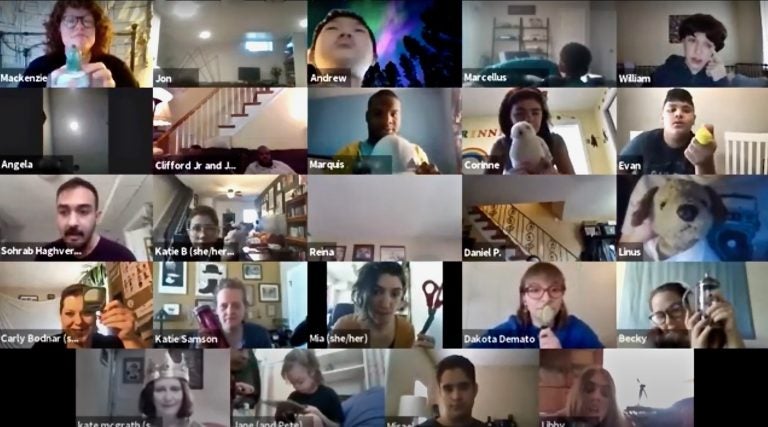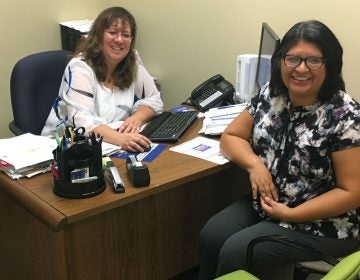Theatre Horizon’s autism theater classes continue through the pandemic
Theatre Horizon in Norristown moved its theater classes online. Some students with autism prefer it that way.

A screenshot shows the participants in the final class of the spring session of Theatre Horizon’s Autism Drama Program. (Courtesy of Theatre Horizon)
In early March 2020, Theater Horizon was just one week into its six-week drama class for young people on the autism spectrum, when the pandemic shut down all theaters in Pennsylvania.
“Immediately, we got calls from parents: `Are you going to still do that? Are you gonna still be there? We’ll come,’” said education director Mydera Taliah Robinson. “We very quickly understood the need.”
Robinson stopped all in-person classes of the Autism Drama Program and moved them online, having no idea how that would work. The weekly sessions include classes for kids — mostly make-believe games and performance exercises — and playwriting workshops for adults, both designed to improve social skills.
Socializing over Zoom, as many have discovered over the past year, can be a challenge. Robinson did not know how easily those who are neurologically atypical would adapt.
But it worked.
“We found that our students have been incredibly engaged, and they’ve been completely locked in,” said Robinson. “Having that self-agency within their home adds to their comfortability and adds to their ability to participate.”
One of those students is Ava Boggi, 16, who has been attending Theatre Horizon’s autism classes for three years.
“We pretend to be someone we’re not,” she said. “We do, like, busy bees.”
Busy bees is a game in which instructors take the students through movements a bee might make as it moves between flowers and the hive. They also mime cooking soup, for example, as a physical warmup exercise that goes through the movements of hoisting a large cauldron, chopping vegetables, stirring, etc.
Boggi said she would like to be an actress but is hampered by anxiety. She feels much more relaxed performing for just her class at Theatre Horizon.
“Sometimes, I get stage fright and I get anxious,” she said during a Zoom interview. “We do like games and pretend stuff, and no one is on the stage or stuff like that.”
“Nobody’s in the audience?” her mother, Christine, asked during the interview. “It’s just you guys?”
“Yeah.”
Ava Boggi is also going to school online, and her mother said she has adjusted remarkably well to doing most of her social and learning activities over the computer, including these theater classes.
“I can attribute that to all the people who know how to work with these kids,” said Christine. “It’s very, very important that people take the time to understand these kids on the spectrum and try to be patient and work with them. I see that all the time with this program.”
Theatre Horizon has been offering classes for people with autism for 15 years, enrolling about 1,000 students, some of them traveling from out of state to attend weekly.
The success of the classes is largely based on the fact that there is a dearth of regular, year-round activities specifically designed for people with autism, particularly for adults who have aged out of most autism programs.
The classes have also built a reputation for using theater techniques to help people with autism express their creativity in their own unique way.
“Many of our students are in programs that are based around behavior management, putting them in a way that society would expect them to react or participate,” said Robinson. “But in this environment, they are absolutely the normal. They are absolutely and fully comfortable. There is really no wrong answer. If we’re playing a game like the floor is lava, there’s no wrong way to express that. You’re just doing it.”
Moving the classes online has brought in a wider range of students. Robinson said some log in from Canada and Washington state. It may also be better for some of the students. People with autism may feel anxiety about being in a semi-public space, even if surrounded by their peers. Some students have engaged better by being surrounded by the familiarity of their own home, a space over which they are in control.
Zach Inkeles, 33, is interested in puppetry and had been working with the autism performance project CivilRites/CivilRights to write and design a public performance for his handmade parakeet puppet, Pavo, but the pandemic suddenly canceled that. Inkeles then signed up with the adult playwriting class at Theatre Horizon.
So far, he has taken two six-week sessions, during which he wrote “A Midsummer Night’s Awakening,” an environmentalist take on Shakespeare’s classic fantasy written for both live actors and puppets.
“I want to expand my storytelling, and more and more writing and telling a story for children’s literature and puppet shows,” he said.
Inkeles said he prefers the classes to be online. Being in a room full of people would be too distracting.
“I can listen and do my own stuff during class,” he said. “If I need to talk, I can unmute and talk to someone if I need to.”
Inkeles said he does not interact with the other students outside of class. Robinson said that’s an important part of the class that cannot be replicated online.
“Our lobby would be full of parents who were waiting, and students could have that time when class was over. It didn’t just disappear like a Zoom link,” said Robinson. “You had a chance to still socialize, to exchange numbers, to make friends where families could engage together and kind of build relationships.”
Robinson is coordinating online events outside of classes, like talent shows and a theater production written by the adult students and acted by the young students. She hopes these extracurricular events will in some way make up for the lost socializing opportunities.

Get daily updates from WHYY News!
WHYY is your source for fact-based, in-depth journalism and information. As a nonprofit organization, we rely on financial support from readers like you. Please give today.







